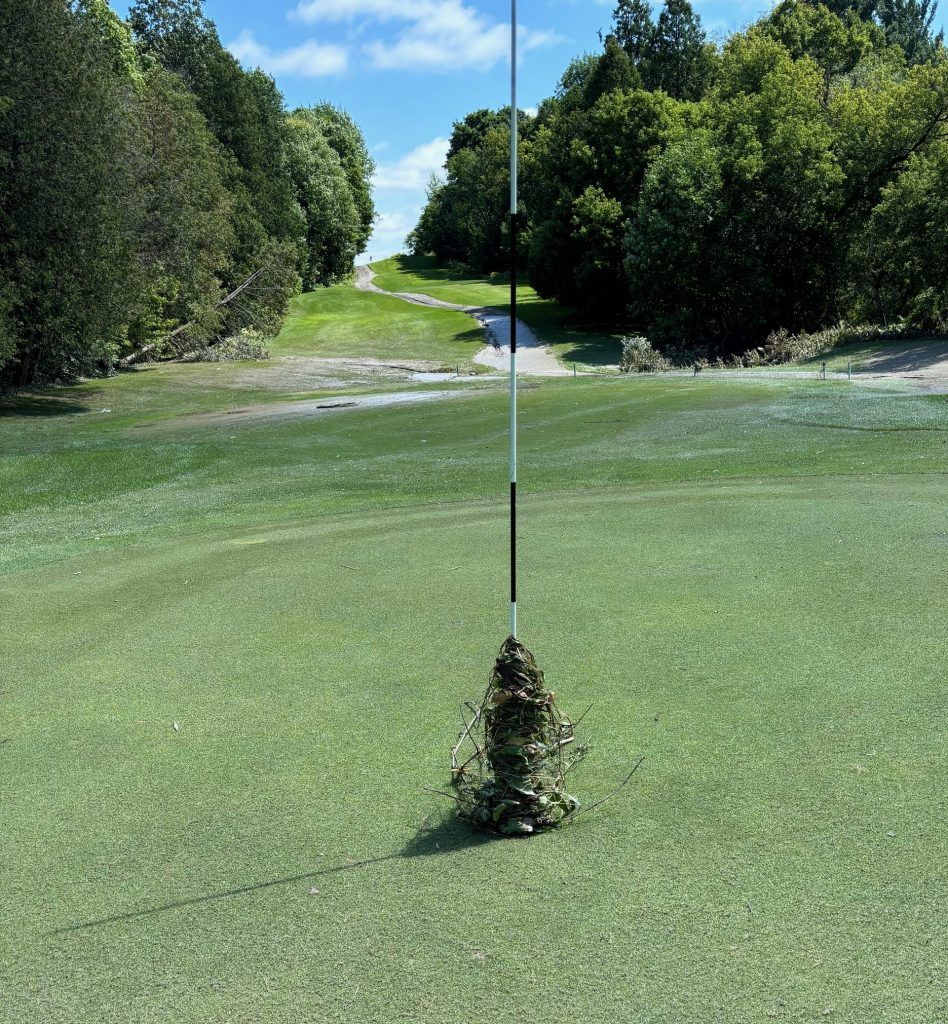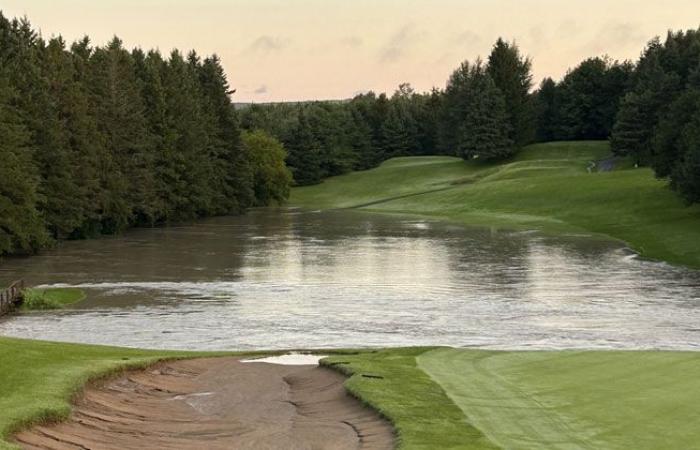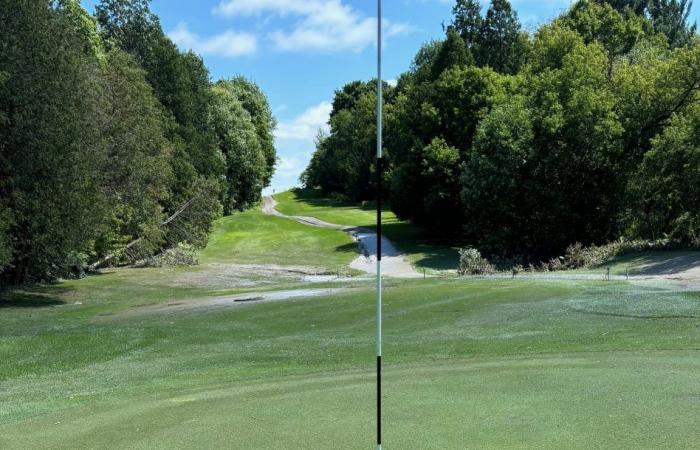Quebec golf course superintendents didn’t have to endure an immensely rainy summer like the one in 2023, but they did have to face different challenges that put their knowledge to the test again. Gathered on the fairways of the Club de
Saint-Georges de Beauce, as part of the Paolo Roberge Open, the superintendents discussed this summer with its varying characteristics from one region to another. However, all are unanimous in saying that they are witnessing climate change.
The 2024 season, perfect for golfers, brought its share of challenges for superintendents. High temperatures accompanied by high humidity required the preventive use of fungicides to prevent the development of diseases on the greens. However, the high temperatures reduced the duration of their effectiveness. The Lower St. Lawrence and Saguenay-Lac Saint-Jean regions received little precipitation.
“Our course was not closed for a single day,” said Jacques Landry, superintendent of the Matane Golf Club. “We lost count of the number of days we were closed last year. We even had to close for a full week. Our irrigation system, which was used very little last season, was working at full capacity for a good part of the summer. Storm Debby, which was supposed to give us 50 to 80 millimetres of rain, actually only gave us 6.2 millimetres.”
Charles Ouellet experienced a similar situation at the Chicoutimi Golf Club.
“We had very little precipitation. The heat and high humidity were very difficult to manage. Of course, we had to water, but that helped increase the humidity. With the very warm nights, we had to be on the lookout to prevent diseases from developing on the greens.”
Charles Ouellet drew on his nine years of experience to control the situation. “It wouldn’t have been a good year for a beginner,” he admits. “It was a stressful season for a superintendent.”

Met a few days before the Paolo Roberge Open, the superintendent of the Club Castor de Valcartier, Anthony Fiset, also spoke about drought management.
“There were several days of great heat between the few episodes of rain. It was not so much the heat that caused problems for us, but the wind that accompanied it and contributed to drying out the land. We often had to start watering again just a few hours after a rainfall.”
To the west, Storm Debby
Superintendents in the more western regions of the province were all about Storm Debby, the weather event that dumped up to 200 millimetres of water on their paths on August 9 and 10.
“Our course had to be closed for both days,” says Sylvain Charpentier of the Boucherville Golf Club. “The efficiency of our drainage system allowed us to reopen on Sunday. It still took a few more days to get the course back in perfect condition.”
As a philosopher, he considers this situation to be much less serious than that suffered by people affected by forest fires.
At Club La Madeleine, around a hundred millimetres of rain soaked the course located in Sainte-Madeleine.
“We even had to spread fungicides in the aisles,” explains superintendent Rémi Daigle.

A somewhat similar situation for Jean-François Marinier at Ki-8-Eb in Trois-Rivières. “We went three days without being able to mow anything, whether it was the greens, the paths or the long grass. Even the all-terrain vehicles got stuck because the ground was so soaked with water.”
The superintendents of the Louiseville and Montcalm clubs in St-Liguori near Joliette, however, were those who had to deploy the greatest means to avoid the catastrophe.
“The level of the river that passes through holes 16 and 18 is normally 25 to 30 feet below the bridges that span it,” says the superintendent of the Louiseville Club, Pierre Rousseau. “The river not only overflowed, it also swept away the two bridges with the strong current. One of them was even overturned and stuck in debris. The green of hole 8 was under several feet of water.”
The maintenance crew and about ten volunteers quickly got to work. “The 22-year-old son of a local contractor was the project manager for the work that allowed the bridges to be replaced,” explains Pierre Rousseau.
Mechanical shovels were installed on both sides of the river. The two bridges were able to be replaced and solidified in record time. We reopened the field six days later!”
Montcalm (headline photo), for its part, narrowly avoided disaster. “The water level rose so quickly that a dike threatened to give way,” said Superintendent Claude Gaudet. “In the middle of the night, rocks had to be transported with trucks to solidify and raise the dike. I can’t imagine what would have happened if the dike had given way.”
Climate change
Superintendents agree that, along with farmers, they are the first witnesses to the impact of climate change.
“For several years, intense rain episodes have brought precipitation of 30 or 40 millimeters of water in a very short time,” notes Antony Fiset of the Castor club. “The grounds cannot absorb such quantities. The water runs off and floods lower areas, tearing up paths in the process. The higher ground, however, lacks water and still has to be watered the next day or the day after. We no longer seem to have days of quiet rain leaving 5 to 10 millimeters of water with time to slowly penetrate the ground.”
A feverish host superintendent

The superintendent of the Saint-Georges Golf Club, Sébastien Dumont, admitted to being a little nervous about welcoming his fellow superintendents from the province.
“I wanted the land to be in perfect condition to welcome them. My guests are connoisseurs. But since they are aware of the challenges of our work, they are also very understanding.”
The superintendent, who is in his first year at Saint-Georges, had no reason to worry. The course was in perfect condition. It drew very positive comments from tournament participants.
Sébastien Dumont noted that he received help from two fellow superintendents for the morning beauty treatment of the course. Stéphane Poulin of Golf du Lac Poulin participated in preparing the traps while Carl Petitclerc, of Golf Mont-Ste-Anne in Saint-Féréol, helped mow the course.









